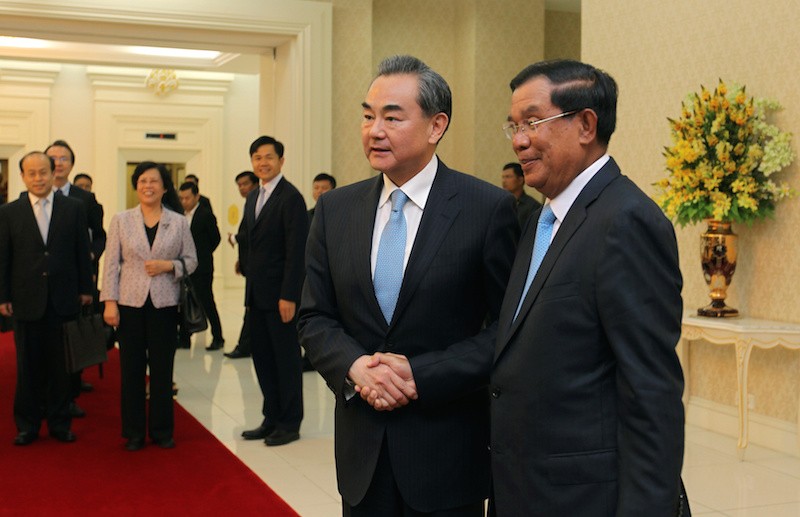Cambodia has blocked any reference to a U.N.-backed court’s ruling against Beijing’s claims to the South China Sea in an Asean statement and is pushing to remove a previously routine phrase expressing concern about the sea’s “militarization,” according to reports.
A spokesman for Cambodia’s government, which China last week promised more than half a billion dollars in aid, said it did not want to interfere in a foreign dispute over sovereignty, but an observer said Cambodia should simply “butt out” in that case.

The statement was meant to be issued on Sunday, ahead of a meeting in Laos today between Asean’s foreign ministers, U.S. Secretary of State John Kerry and Chinese Foreign Minister Wang Yi, but was scuppered by infighting, Agence France-Presse (AFP) reported.
Asean’s 10 member nations started drafting the statement on Wednesday, AFP said, with most members supporting a call for all countries to “respect [the] diplomatic and legal process” after the Hague-based Permanent Court of Arbitration ruled against Beijing’s territorial claims in the South China Sea on July 12.
A Reuters report on Saturday, however, said the regional bloc had been “thrown into disarray” after Cambodia vetoed any such calls—before also pushing to remove a standard phrase included in past statements expressing concern over military activity in the sea.
“Cambodia is unbelievable,” Reuters quoted an anonymous diplomat as saying. “It is blocking any phrase about the arbitration and about militarization.”
“Our house is in a mess,” another diplomat, identified only as being from Indonesia, was quoted as saying.
A diplomat quoted by AFP said the bloc may release a “really watered down” statement in the coming days. Half of the bloc’s members—Vietnam, Indonesia Malaysia, Brunei and the Philippines—claim some rights to the South China Sea
The arbitration court’s July 12 decision enraged China, which three days later pledged more than $500 million in aid to Cambodia, leading to accusations that it was attempting to buy influence.
Beijing’s state news agency, Xinhua, on Saturday quoted Chinese Vice Foreign Minister Liu Zhenmin as saying that Asean should not let outsiders influence its decisions on the disputed sea, through which more than $5 trillion in global trade passes annually.
“They should in particular guard against the intervention in regional cooperation by big powers outside the region,” Mr. Liu said, in a clear rebuke to the U.S., which Prime Minister Hun Sen this month also appeared to accuse of interfering in the dispute.
Xinhua published a commentary on Sunday calling the ruling against China a “blow to peace and stability in the region…and [one that] only serves to increase the likelihood of confrontation and turbulence.”
Council of Ministers spokesman Phay Siphan said that Asean operated by consensus and that Cambodia’s government had no interest in getting involved in a dispute over sovereignty between China and other members of the bloc.
“It does not involve Cambodia, [these] sovereign conflicts. Cambodia sticks with the Asean principle to go through diplomatic channels to solve it with peace,” Mr. Siphan said.
“We don’t want any one of us [in Asean] to become an enemy of the other. We want a resolution that maintains relations and cooperation. We do not want war,” he said.
“We’re close to China, but it does not mean we are a puppet of China, and we are not going to be a puppet of the U.S., too,” he added. “Nobody orders Cambodia to do this or do that. Don’t order us.”
Speaking from Ho Chi Minh City, Carl Thayer, an emeritus professor at the Australian Defense Force Academy in Canberra, said Cambodia’s position on the maritime dispute was increasingly hurting relations with its neighbors.
“I spoke to Vietnamese diplomats here today. They have learned to live with Cambodia under Hun Sen, they have good military-to-military relations, and they won’t say how bad Cambodia is unless you ask, but they’re not being led down the garden path,” he said. “Hun Sen, by undermining Asean in this way, is antagonizing—more or less permanently—Singapore, Indonesia, Malaysia, the Philippines and Vietnam.”
Mr. Thayer also said Mr. Hun Sen’s argument that the decision did not concern Cambodia was self-defeating.
“Then he should shut up and follow through on that,” he said of such claims. “If this is not a decision that affects Cambodia, they should butt out, to speak frankly, and follow the majority decision.”
It is not the first time Cambodia has blocked a joint statement from Asean to the chagrin of members with claims to parts of the South China Sea that overlap with the extensive area claimed by Beijing via maritime maps employing a U-shaped “nine-dash line.”
In July 2012, when Cambodia hosted the Asean summit, the bloc failed to issue a joint statement for the first time in its 45-year history due to disagreements over the sea, with Cambodia also blamed at the time for its subservience to Beijing.
“It is the same story again—a repeat of the meeting in 2012,” an Indonesian diplomat was quoted by Reuters as saying on Sunday evening. “We have been here before, and I hope they can solve it.”
The Wall Street Journal reported on Sunday that some Southeast Asian diplomats had suggested scrapping Asean’s age-old requirement that consensus be reached on decisions but that others had expressed concerns about the impact such a shift might have on the bloc’s image of unity.
Yet Mr. Thayer said that if Cambodia continued to be inflexible, other Asean members might be left asking: “Why should Cambodia stay in Asean?”—or at least requesting that Cambodia recuse itself from the drafting of future statements on the South China Sea
“I’m wondering,” Mr. Thayer said, “if this will be the tipping point for them to just say: ‘Get out of the room, Cambodia, you’re hindering the process.’”



